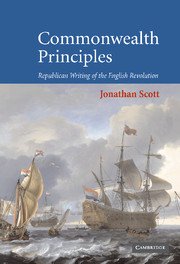Book contents
- Frontmatter
- Contents
- Preface
- Introduction: English republicanism
- Part I CONTEXTS
- Part II ANALYSIS
- Part III Chronology
- 11 Republicans and Levellers, 1603–1649
- 12 The English republic, 1649–1653
- 13 Healing and settling, 1653–1658
- 14 The good old cause, 1658–1660
- 15 Anatomies of tyranny, 1660–1683
- 16 Republicans and Whigs, 1680–1725
- Appendix: ‘a pretty story of horses’ (May 1654)
- Bibliography
- Index
12 - The English republic, 1649–1653
Published online by Cambridge University Press: 22 September 2009
- Frontmatter
- Contents
- Preface
- Introduction: English republicanism
- Part I CONTEXTS
- Part II ANALYSIS
- Part III Chronology
- 11 Republicans and Levellers, 1603–1649
- 12 The English republic, 1649–1653
- 13 Healing and settling, 1653–1658
- 14 The good old cause, 1658–1660
- 15 Anatomies of tyranny, 1660–1683
- 16 Republicans and Whigs, 1680–1725
- Appendix: ‘a pretty story of horses’ (May 1654)
- Bibliography
- Index
Summary
God hath … made you the happie Instruments of freeing us from the yoke of Kings … how nobly you asserted the Rights of England against Domestick Tyrannie, upon the neck of the late King … when Justice sat more gloriously inthroned than ever it did before on any earthly tribunal … It is your honor, that God hath made you Founders of the most famous and potent Republick this day in the world, and your felicitie, that all your Enemies have no other Ground of quarrel, but that you are a Republick.
Marchamont Nedham, Epistle Dedicatorie, Of the Dominion … of the Sea (1652)‘A NEW ORDER IN THE STATE’?
In the early months of 1649, from the ashes of a tyranny, England erected its first ‘Free State’. So, at least, ran the record of parliament's pronouncements. On 4 January the House of Commons voted ‘That the people are, under God, the original of all just power.’ On 7 February, little more than a week after the regicide, the resolution was carried without a division ‘that it hath been found by experience … that the office of a king in this nation, and to have the power thereof in any single person, is unnecessary, burdensome, and dangerous to the liberty, safety, and public interests of the people’.
- Type
- Chapter
- Information
- Commonwealth PrinciplesRepublican Writing of the English Revolution, pp. 252 - 272Publisher: Cambridge University PressPrint publication year: 2004

